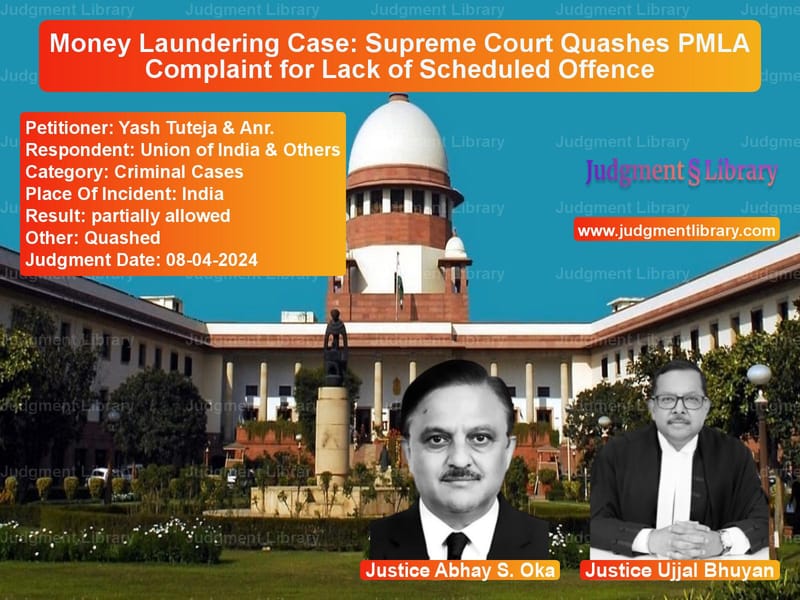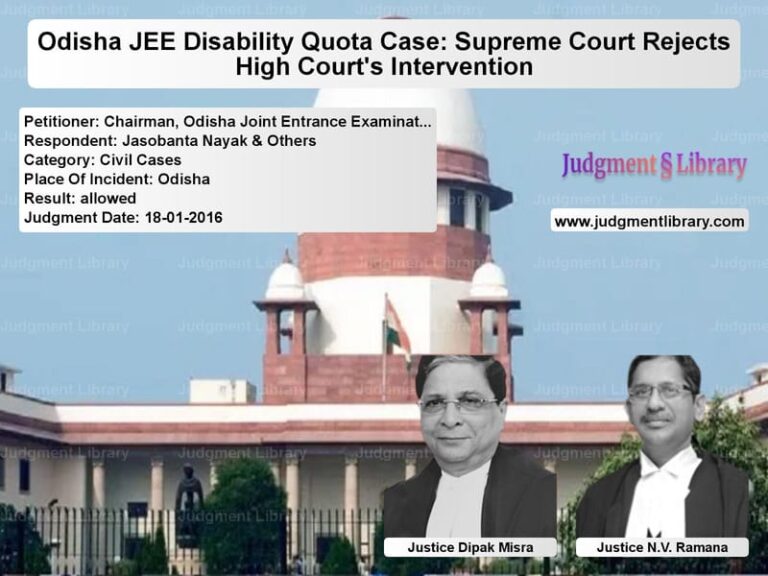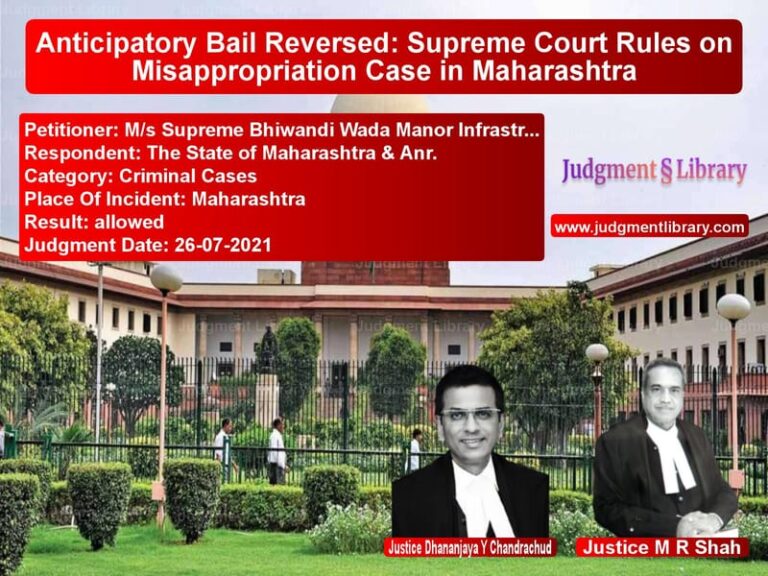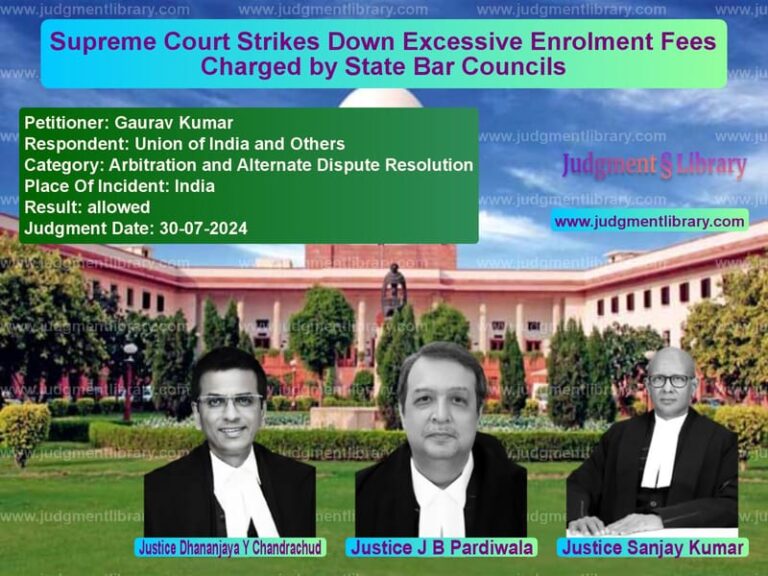Money Laundering Case: Supreme Court Quashes PMLA Complaint for Lack of Scheduled Offence
The case of Yash Tuteja & Anr. vs. Union of India & Others revolves around the scope of the Prevention of Money Laundering Act, 2002 (PMLA) and the necessity of a scheduled offence for initiating proceedings under the Act. The Supreme Court examined whether a complaint filed by the Enforcement Directorate (ED) under Section 44(1)(b) of PMLA could be sustained in the absence of a scheduled offence.
Background of the Case
The ED initiated proceedings under the PMLA based on an Enforcement Case Information Report (ECIR/RPZO/11/2022). The allegations in the complaint stemmed from various provisions of the Income-tax Act, 1961 and Sections 120B, 191, 199, 200, and 204 of the Indian Penal Code, 1860 (IPC). However, except for Section 120B (criminal conspiracy), none of these offences were listed as scheduled offences under PMLA.
The petitioners challenged the complaint, arguing that without a scheduled offence, the PMLA case could not be sustained. The Supreme Court had to decide whether the proceedings could continue based solely on an alleged conspiracy to commit non-scheduled offences.
Arguments by the Petitioners
- The PMLA requires a scheduled offence to establish “proceeds of crime.” Since the offences alleged (except Section 120B) were not scheduled offences, the case was legally unsustainable.
- The ED’s reliance on Section 120B IPC was flawed because conspiracy under PMLA must relate to a scheduled offence, not just any criminal act.
- The Supreme Court’s decision in Pavana Dibbur v. Directorate of Enforcement established that “the existence of a scheduled offence is a condition precedent for the existence of proceeds of crime.”
- Since there were no proceeds of crime, the offence under Section 3 of PMLA was not made out.
Arguments by the Respondents (Enforcement Directorate)
- The ED contended that the complaint was valid since the accused were involved in financial misconduct, including conspiracy to evade taxes.
- They argued that once a conspiracy charge was included, it could bring related financial irregularities under PMLA.
- The Special Court had not yet taken cognizance, and the complaint should be allowed to proceed so the trial court could examine its merits.
Supreme Court’s Analysis and Judgment
The Supreme Court referred to its previous ruling in Pavana Dibbur and concluded that the ED’s complaint was not legally sustainable:
- Requirement of a scheduled offence: “The offence punishable under Section 120B IPC will become a scheduled offence only if the conspiracy alleged is of committing an offence which is specifically included in the Schedule.”
- No scheduled offence was alleged: “The conspiracy in the present case is related to offences under the Income-tax Act and certain provisions of IPC, which are not included in the Schedule to PMLA.”
- Proceeds of crime cannot exist without a scheduled offence: “The condition precedent for the existence of proceeds of crime is the existence of a scheduled offence.”
- Without proceeds of crime, PMLA does not apply: “If there are no proceeds of crime, the offence under Section 3 of PMLA is not made out.”
The Court also addressed the procedural argument that the Special Court had not taken cognizance yet:
- The Special Court must apply its mind to determine if a prima facie case exists.
- In the absence of a scheduled offence, there is no prima facie case under PMLA.
- Directing the Special Court to consider the complaint would be a meaningless formality.
Supreme Court’s Order
The Supreme Court issued the following directives:
- The complaint based on ECIR/RPZO/11/2022 was quashed for two of the petitioners.
- Two other writ petitions were disposed of as those petitioners were not named in the complaint.
- The Court clarified that any new proceedings initiated by the ED based on a separate FIR alleging a scheduled offence would be considered independently.
- The interim order protecting the petitioners from coercive action was extended for three more weeks to allow them to seek relief from appropriate forums.
Conclusion
The Supreme Court’s ruling reaffirms that the ED cannot proceed under PMLA unless a scheduled offence is alleged. This decision strengthens safeguards against misuse of money laundering laws for non-scheduled offences, ensuring that individuals are not prosecuted under PMLA for financial irregularities that do not meet the Act’s specific criteria.
Petitioner Name: Yash Tuteja & Anr..Respondent Name: Union of India & Others.Judgment By: Justice Abhay S. Oka, Justice Ujjal Bhuyan.Place Of Incident: India.Judgment Date: 08-04-2024.
Don’t miss out on the full details! Download the complete judgment in PDF format below and gain valuable insights instantly!
Download Judgment: yash-tuteja-&-anr.-vs-union-of-india-&-oth-supreme-court-of-india-judgment-dated-08-04-2024.pdf
Directly Download Judgment: Directly download this Judgment
See all petitions in Money Laundering Cases
See all petitions in Bail and Anticipatory Bail
See all petitions in Judgment by Abhay S. Oka
See all petitions in Judgment by Ujjal Bhuyan
See all petitions in partially allowed
See all petitions in Quashed
See all petitions in supreme court of India judgments April 2024
See all petitions in 2024 judgments
See all posts in Criminal Cases Category
See all allowed petitions in Criminal Cases Category
See all Dismissed petitions in Criminal Cases Category
See all partially allowed petitions in Criminal Cases Category







